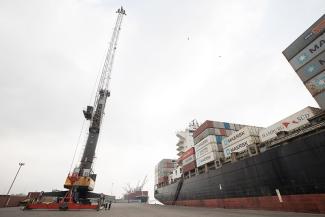Port of Cotonou
Competitive squall at the pier

Benin is one of the world’s poorest countries, but nonetheless has a few economic trump-cards. According to official statistics, the economy has grown steadily in the past four years. Substantial investments have been made in infrastructure. Efforts are also underway to significantly increase cotton and cashew-nuts production, the country’s main cash crops.
As investments in power generation have increased, the incidence of blackouts has fallen. And Cotonou, the country’s economic hub, boasts a seaport. It attracts cargo bound for land-locked neighbours such as Burkina Faso, Niger and Mali, as well as for its wealthier neighbour Nigeria. Regional integration within the Economic Community of West African States (ECOWAS) is less than perfect, but it helps the port to thrive.
The Autonomous Port of Cotonou is “the lung of the national economy,” according to the World Food Programme’s Logistics Capacity Assessment (LCA), a database of information on the logistics capacity of the world’s ports to handle humanitarian aid deliveries.
The port handles trade with Europe, North and South America and Asia, “making Cotonou a ‘warehouse city’ generating intense trade, handling and logistics activity,” according to the LCA, which adds that Cotonou is the fourth most important port in West Africa.
A glance at the statistics shows the port’s economic significance for Benin. According to the LCA, the port handles 90 % of Benin’s foreign trade and generates more than 60 % of its GDP. It processes an annual freight volume of 12 million tonnes, according to Port of Antwerp International (PAI). This subsidiary of Belgium’s Antwerp Port Authority was chosen to modernise Cotonou in late 2017.
A walk along the port’s docks brings the statistics to life. An astounding variety of goods pours in daily: manufactured foods, bulk agricultural crops, fertilisers, metals and minerals, Chinese fabrics, second-hand clothes, used vehicles and household appliances.
That last category – used vehicles and household appliances – has become a blemish on the port’s reputation. It has become known or even infamous for handling imports of used vehicles and other equipment that would fail technical inspection in developed countries. Large shipments of old, rusting trucks and broken household appliances transit through Benin, heading for inland markets. They may be affordable, but they are of poor quality and environmentally harmful.
The port has its share of problems beyond the image issues associated with its trade in broken vehicles. Logistics companies complain about long waiting times. According to Africa News, the PAI was tasked with improving that record, by reorganising and restructuring the administration, computerising services, disseminating a code of good behaviour and training the staff, among other things. Results remain to be seen.
Competitive jolt
All these challenges pale in comparison with the jolt the port received on 20 August 2019: Nigeria’s federal government imposed a ban on imports over land borders of a wide variety of items, including a range of foods, used clothing and furniture. The ban was reinforced with an order that blocked Nigeria’s Central Bank from providing hard currencies for purchasing banned items.
Until this decree, Nigeria, with its 200 million inhabitants and relatively high purchasing power, had been one of Benin’s – and the Port of Cotonou’s – best customers. Nigeria’s government justified its action by pointing to high rates of smuggling and a general need to crack down on crime.
At the same time, Nigeria made moves to boost its own capacity to handle maritime trade. The government announced plans to build a new deep-sea port in Warri, Delta State, thanks to Chinese investment and is considering two additional facilities to handle maritime trade. The background is that the two seaports in Lagos, West Africa’s commercial hub, face serious congestion. Cotonou’s port has benefited from the Lagos Port Complex at Apapa and the Tin Can Island Port being overburdened.
In the competitive market for port services, the likely upgrade of the Nigerian ports that serve Lagos is bad news for Cotonou. So far, it has received much of the seaborne cargo bound for Nigeria. Capacity constraints in Nigeria were an important reason.
According to John Igué, Benin’s former minister of trade, a long-lasting ban on trade over land borders with Nigeria will only worsen Benin’s economic outlook. The ban could also encourage smugglers to evade the decree, as domestic prices rise in Nigeria in response to scarcity.
The Port of Cotonou’s Belgian managers are evaluating their response to the new competitive challenge. According to press reports, Benin will start implementing a € 450 million modernisation plan at the Port of Cotonou in 2020. The aim is to make the port a more secure and efficient platform for its many trading partners, not just those in Nigeria. In the competitive world of ports, that is the only way forward.
Karim Okanla is a media scholar and freelance author based in Benin.
karimokanla@yahoo.com
Link
The World Food Programme’s Logistics Capacity Assessment:
https://dlca.logcluster.org/display/public/DLCA/LCA+Homepage








